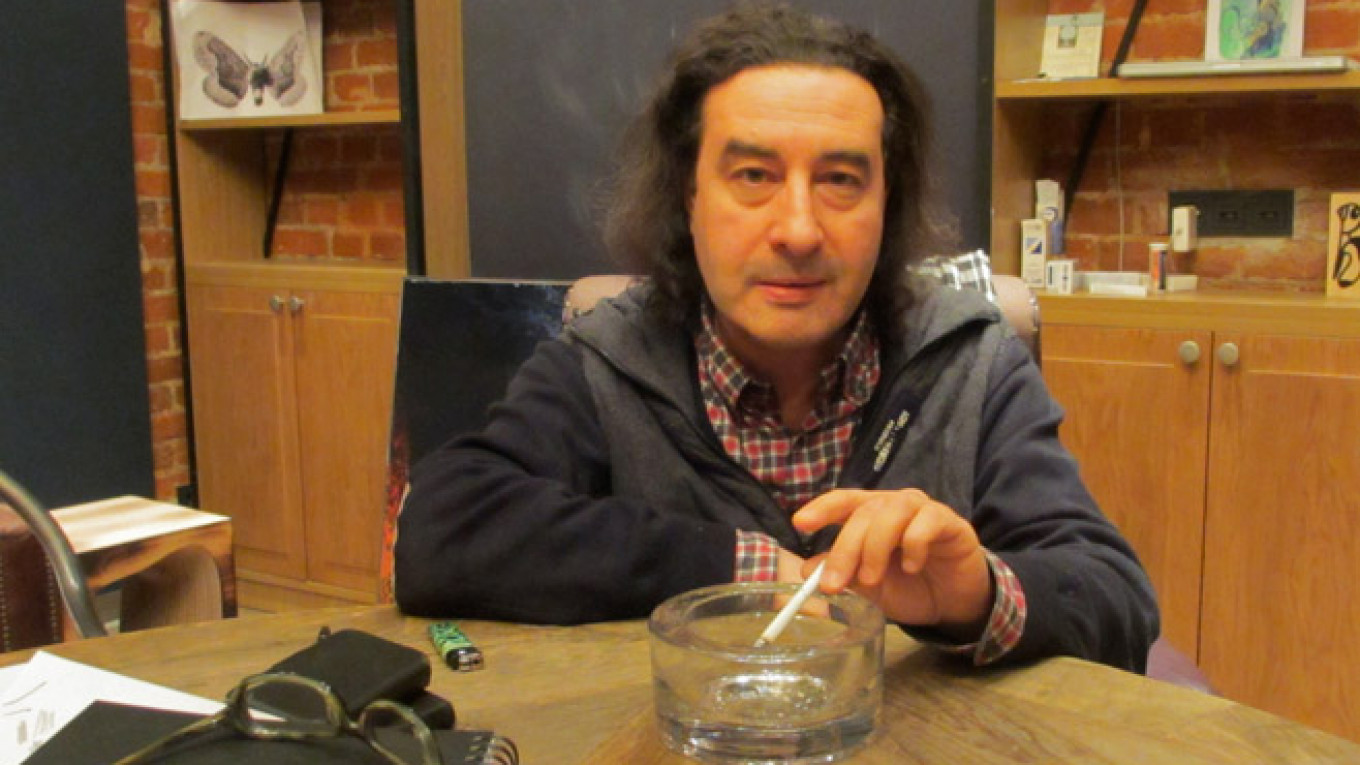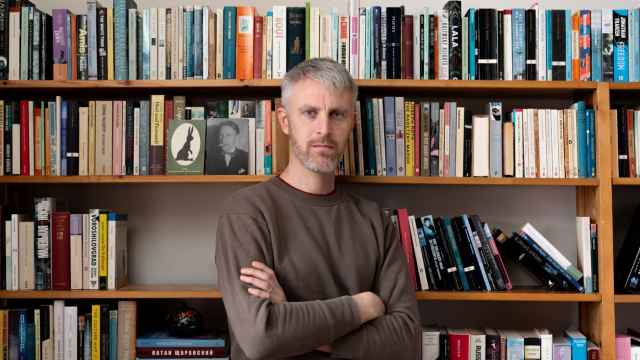Mark your calendar: Jan. 26, 2015. Something big is brewing.
On that date the theater we have long called the Stanislavsky Drama Theater, just up Tverskaya Ulitsa from Pushkin Square, will be rechristened the Stanislavsky Electrotheater.
Why "Electrotheater"?
"'Electro' means 'light' in Greek," director Boris Yukhananov tells me as he sits at a huge working table in his office overlooking Tverskaya Ulitsa. "The first Russian cinemas were called 'electrotheaters,' and this space housed the Ars, one of the city's first movie theaters."
But Yukhananov is not only looking back as he recreates one of Moscow's iconic venues. He intends to bring Moscow something entirely new in the very near future.
"This theater will not represent a single point of view," Yukhananov tells me. "No! I don't want that. My mission is to present this city with many different kinds of art."
If you know Russian theater, you recognize those as words of heresy.
The great tradition of the Russian auteur director, beginning with Stanislavsky over 100 years ago and continuing with contemporary masters like Lev Dodin and Kama Ginkas, is one in which the director is the captain of the ship, the navigator and the advance scout all in one. Two greats that we lost in recent times, Pyotr Fomenko and Yury Lyubimov, were very much part of that tradition.
Yukhananov, who was appointed artistic director of the Stanislavsky Drama Theater in early summer 2013, is out to shake the institution of Russian theater down to its core. That is something he has sought to do in various ways for 30 years.
Highly respected as one of the most talented pupils ever to study directing under the great team of Anatoly Efros and Anatoly Vasilyev in the 1980s, Yukhananov always marched to his own drummer. He created numerous avant-garde theaters and projects over the decades, some of which had minimal impact, some of which were highly praised, but all of which invariably left people talking.
Yukhananov has an appetite for the enormous, the unusual and the challenging, and that is a crucial element in the way he has gone about rebirthing the Stanislavsky. The director has a penchant for productions that run three days at five hours a pop. He did that with his famous, transformative productions of "The Orchard," based on Anton Chekhov's "The Cherry Orchard," in the 1990s. He did it in varying degrees with productions of "Faust," "The Golem" and "The Constant Principle" in recent years.
At the Electrotheater we will eventually see a revival of "The Constant Principle" as well as a new version of a show called "The Sverlitsy," which Yukhananov describes as a series of "six operas running over five nights." But the point is that Yukhananov is not putting himself at the center of the new theater's universe. He is not even focusing solely on Russian talent. Two of the first four productions will be mounted by famous Europeans.
The Stanislavsky Electrotheater will open in January with Euripides' "The Bacchae" staged by the renowned Greek director Theodoros Terzopoulos. It will be followed three weeks later by Yukhananov's radical interpretation of Maurice Maeterlinck's "The Blue Bird," which will run in eight parts over three days, and then, in March, by Alexander Ogaryov's production of Cuban-American playwright Nilo Cruz's "Anna in the Tropics."
Next up will be Italy's Romeo Castellucci, who, also in March, will unveil his "Human Utilization of Human Entities," a piece based loosely on Giotto's fresco "The Raising of Lazarus."
"Castellucci's show is pretty much ready right now," Yukhananov told me. "I've seen the rehearsals."
"Where could anybody possibly rehearse in this building?" I responded in amazement.
I had just returned from a 40-minute tour of four floors of the enormous, sprawling building, which was originally built in 1915 and which is now under major reconstruction. Amid the dust, marble slabs, glass plates, metal cross beams, paint cans, kilometers of electrical wiring and an army of workmen and -women, I had seen no place anyone could possibly rehearse anything.
Yukhananov shined a satisfied smile on me and said, "You didn't see the six rehearsal halls? I'll have them show you those when we finish talking."
And without wasting a breath, he launched into a detailed description of the way he went about completely transforming the Stanislavsky from the first day he set foot in the theater two summers ago.
He first created a fund raised out of private money that allowed him to send every employee on a paid two-month vacation. Then over the course of two weeks he had trucks haul everything out of the theater, down to the last stray pencil. Meanwhile he brought in construction teams that outfitted six rehearsal halls and a floor-full of administrative offices.
"By the time everyone returned from vacation, there were places for them to work," Yukhananov explained. "That allowed us to take our first step in the transformation without losing time or people."
As rehearsals began, Yukhananov, with a team from Moscow's WowHaus design and architecture firm, began the prodigious job of reclaiming every possible centimeter of space in a building that had been restructured numerous times over the last 100 years, usually without anyone giving thought to the consequences. In the course of their work they discovered a half a dozen lost windows, delicate stucco moldings on walls and ceilings, vaulted ceilings no one knew existed, and the train tracks on which the entire building was moved back over 10 meters when Tverskaya Ulitsa was widened in 1939.
The entire reconstruction of the Stanislavsky is being carried out on funds provided by private investors. Moscow Culture Minister Sergei Kapkov has been quoted as saying that the cost is about $25 million.
A restaurant that occupied most of the theater's first floor for the last 15 years was moved out, and that space was reclaimed for an art gallery and a new, spacious coat rack.
"The old coat rack had fewer hooks than there were seats in the house," Yukhananov pointed out. "That is taken care of now."
The business end of the building — the stage and auditorium — is being completely transformed. The stage was ripped out, as were the seats. When the theater opens in January, spectators will see a long, open hall that can be reconfigured by directors and designers virtually any way they want. The maximum seating will be 250, down from the original 450, in part because the balcony will no longer be a public space.
In time a small stage will be opened for experimental work, and Yukhananov has already rented and renovated an industrial space near Belorussky Station, where he also plans to show student works and other unusual projects.
"This will give young, student directors a place to work with experienced, veteran actors," Yukhananov explained. And then, ever the experimenter and lover of risk, he added, "This is also where a master director may come and trip over his own method."
Contact the author at artsreporter@imedia.ru
A Message from The Moscow Times:
Dear readers,
We are facing unprecedented challenges. Russia's Prosecutor General's Office has designated The Moscow Times as an "undesirable" organization, criminalizing our work and putting our staff at risk of prosecution. This follows our earlier unjust labeling as a "foreign agent."
These actions are direct attempts to silence independent journalism in Russia. The authorities claim our work "discredits the decisions of the Russian leadership." We see things differently: we strive to provide accurate, unbiased reporting on Russia.
We, the journalists of The Moscow Times, refuse to be silenced. But to continue our work, we need your help.
Your support, no matter how small, makes a world of difference. If you can, please support us monthly starting from just $2. It's quick to set up, and every contribution makes a significant impact.
By supporting The Moscow Times, you're defending open, independent journalism in the face of repression. Thank you for standing with us.
Remind me later.







